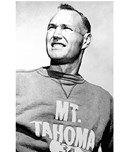What have you been up to since your time with NASA? You’re an entrepreneur and a speaker?
Right, since leaving NASA a little over thirteen years ago I started working for myself. I jumped up and started doing some speeches first with the Speakers Bureau of Hosts. Then fairly recently, just within the past couple of years, with my own company to formalize some of that activity.
I also worked as a consultant for both aerospace and other technology fields. I’ve been involved in some technology startups and right now I’m associated with universities. I was a Distinguished Chair Professor at Louisiana State for a while. I’m still a part of Rice University here in Hudson and Baylor College of Medicine. I do a lot of that, mostly for fun or personal interest.
The thing I’m focused on now is my little company I started a few years ago, One Orbit. We have two sides to our organization. We do the corporate work like keynotes, workshops on topics you might expect - leadership, how to avoid complacency, how to bring your organization to the next level, things like that. A lot of personal views and lessons brought from NASA that can be applied to the corporate world. But on the more fun side we’re geared towards students. We do a lot of sponsored student activities; a corporation will come and pay us to go to their local area and visit schools and motivate kids to get them excited and start thinking about what they want to do. That’s really rewarding. I have twelve year-old twins, and I’m especially interested in helping young people develop their futures.
These are young kids? Like elementary aged?
Right! We speak to elementary all the way through university level students, so obviously we have different talks we give to the different levels. But our sweet spot is that middle school, twelve to thirteen year-old age group. That’s really when the kids are trying to figure out what they want to do. It’s those awkward years when hormones start up and the behavior starts changing and all that. That’s the sweet spot of hitting these young people.
Do you view yourself as a leader? Do you feel like you’ve always been a leader or is it something you’ve grown into over time?
I definitely have held leadership positions, including being Commander of the International Space Station. I’ve led more small-to-medium sized groups and organizations. I’ve never been the leader of a large corporate organization, but the fundamental principles are the same. But no, I do not consider myself a natural born leader. I was definitely not as a younger person. It was something I had to learn and grow into, and that’s kind of what I talk about in some of the leadership presentations.
Not everyone - in fact, I would say most leaders are not born leaders. There are a few people that are unique, that you’ve known since they were young had that quality. But I think one of the best characteristics of a leader is someone who can take care of the people that they are leading, and doesn’t forget about what being a leader is about.
Oftentimes, I talk about how leaders forget they’re supposed to be leading people and building teams. They’re not supposed to be managing people and the process, you hire a manager for that. I saw a lot of that at NASA. In my presentations, I talk about some of the folks that lost their way and present strategizes to keep yourself from falling into some of those traps.
What qualities do you think make a great leader?
I think it gets summarized pretty quickly with General Norman Schwarzkopf. To paraphrase him, and I think he was one of the best leaders of our time, he said, “It’s always about honesty, integrity, and always being willing to do the right thing.” It’s that last point that’s so important - always being willing to do the right thing. His point was most, if not all of the time, you know what the right thing to do it. A lot of the time that might be very difficult. There might be enormous consequences to making that decision and going down that path, but if you’re a leader who’s always willing to do the right thing, you’re going to earn the respect of the people around you. Not only the people you’re leading, but your peers and everyone else that is familiar with the situation. Sometimes it comes with enormous cost; you may lose your job or your position of leadership over it. But if you have those qualities of a leader then you’re going to find other opportunities.
So, I think that kind of sums up what is important in a leader. Communication, of course. It sounds like a cliché but it’s so important. As a leader you have to be able to communicate both down to the people underneath you, as well as to those you report to - folks on the Board of Directors, whoever that is, you’ve got to be able to clearly articulate your expectations to your team. You’ve got to make sure everyone pulls in the right direction and you’ve got to take into account the difference of people. You need to understand your audience is not all going to respond to the same thing. You have to say the same thing different for different people to hear you. There’s different personality types. Some people like to get a direct order, “Here’s what you need to do.” Other people don’t like that, they bristle at it. You need to coax them and bring them along. Other personalities you need to explain why the decision is this and they need to understand to be a part of it. You’ve got to take all that into account when you’re talking to a lot of different types of people. When you’re talking to a group it can be especially challenging, but you’ve got to make sure you communicate and incorporate those different ways of saying the same thing to make sure you reach all the different types of people and they hear you.
The mission statement of Phi Kappa Tau is, “To champion a lifelong commitment to brotherhood, learning, ethical leadership and exemplary character.” Do you feel like that is still a relevant vision statement today? Given that, what would your leadership challenge be to our young members?
Oh, absolutely. I think those are very fundamental, visionary leadership statements. I think they’re timeless. Anyone who talks about leadership or knows anything about leadership is going to touch on those points, maybe in different words but it’s going to mean the same thing. I think those definitely apply to today. For young people, university life is an exciting time and a very difficult time. You’re going to be placed in positions, academically and otherwise, that could have far-reaching ramifications. Part of the social structure of being in a fraternity and the Greek system - even though the Greek system gets some bad press - is that there’s a lot more good things that happen than bad. You have the support of your brothers in your fraternity and your sisters in your sorority, and they can help guide you, especially the older members. If you’re in a situation where you’re facing some dilemma, you have guidance on those tough decisions. It’s important to have fun, but it’s important to remember to do the right thing as well.
My final question for you: given that I’m sure there was only a limited amount of objects you could bring with you, why did you bring the Phi Tau flag into space?
It was especially important on my first flight to bring things that were significant or had influenced me in some way. Phi Kappa Tau was part of that. My fraternity experience was a very positive one it was a very enriching one to me. As I mentioned before, I have lifelong friends. I learned some lessons – I made some mistakes, but I learned lessons – so it was import for me to bring along the symbol of the Fraternity. The flag was the best way to do that.
My heritage is Chinese - I was born in the United States, I’ve always been an American, but my parents were both born in China, - so I wanted to bring something that would represent Chinese people around the world. For example, I brought a Chinese flag. I brought and wanted to bring a Taiwanese flag, but the State Department didn’t like that, we had already broken off relations with Taiwan. I was able to bring a Confusion Scroll for Taiwan and present it back to them. I brought a carving of flowers – the name of the flower escapes me – but it’s a symbol of Hong Kong. I also brought personal items: jewelry, for family and loved ones. I brought my wrist watch, which was an important thing to me. I brought a wristwatch for my best friend, he wanted me to fly his watch for him. You know, little things like that. Photographs of your loved ones I kept in my notebook. Those are kind of the items I brought.
Thank you to Dr. Chaio for giving your time to Phi Tau!




















